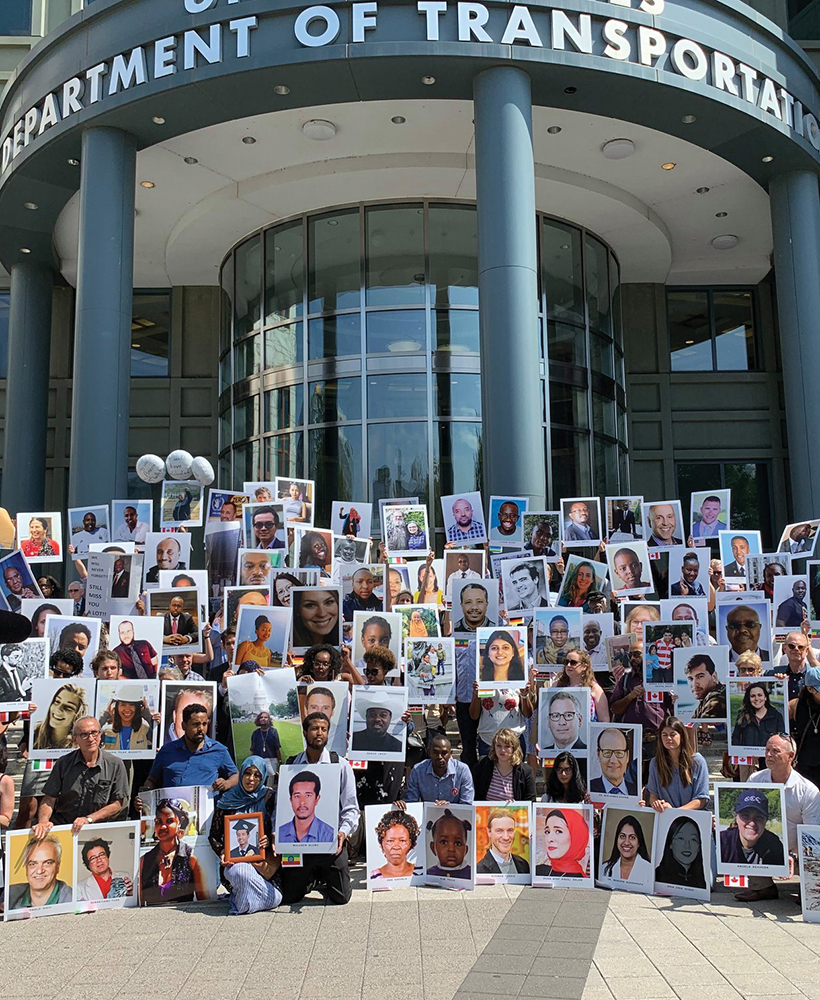Demonstrators gathered for a vigil in honor of the victims of March’s Ethiopian Airlines crash, which took the life of Cedric Asiavugwa (LAW ’19), outside the Department of Transportation on Sept. 10.
The vigil commemorated the six-month anniversary of the Ethiopian Airlines crash which killed 157 people March 10. Participants held up photographs of the victims that were killed in the crash, including Asiavugwa. The Ethiopian Airlines crash is the second accident involving a 737 Boeing Max; the Lion Air crash in Indonesia took place five months earlier in October 2018 and killed all 189 passengers and crew aboard.

Nadia Milleron, whose daughter, Samya Stumo, was killed in the crash, co-hosted the vigil. Milleron organized the vigil because of her struggles arranging a meeting with Ali Bahrami, the Federal Aviation Administration’s associate administrator for aviation safety, who failed to address safety concerns about the plane, she said.
“The reason we did the vigil was because of the frustration of not being able to get that meeting,” Milleron said in an interview with The Hoya. “We did it to remind the world that this is the cost and any one of you, your friends, your family could be us.”
Boeing discovered a problem with a key safety feature on its 737 Max planes in 2017 within months of the company delivering the first 737 Max planes to airlines, according to a statement from Boeing in May 2019. The indicator, an “Angle of Attack Disagree Alert,” is designed to warn pilots if the plane’s sensors are transmitting incorrect data about the direction of the plane’s nose.
Boeing conducted a safety review that concluded the nonworking alert did not affect airplane safety or operation, and the company chose not to disclose the issue to airlines or safety regulators until after the Lion Air crash in October 2018, according to NPR.
Boeing failed to comprehensively address the safety feature issue after the Lion Air crash, and the company’s negligence cost innocent lives, according to Milleron.
“They figured that was enough time for Boeing to correct the problem while the plane remained in service, but that decision killed our family,” Milleron said. “That decision killed my daughter.”
Since the March crash, Boeing has faced broad public backlash. Boeing is dedicated to supporting those affected and will prioritize improving safety features on the 737 Max, according to the company.
“Our hearts go out to the loved ones of those whose lives were lost, and this will continue to weigh heavily on us,” a Boeing spokesperson wrote in an email to The Hoya. “We are committed to supporting the affected communities and working with customers, global regulators and industry partners to make the 737 MAX one of the safest airplanes to ever fly.”
The company plans to dedicate a $50 million fund of short-term aid to families of the victims of both the Ethiopian Airlines crash and the Lion Air crash, according to a July news release from the company.
Boeing also completed updates to the plane’s software and was in the process of testing and documentation with the FAA to recertify and resume operation of the aircraft, according to a Boeing news release from May.
Boeing is now providing additional information to the FAA’s requests that includes details on how pilots interact with the airplane controls and displays in different flight scenarios, according to a Boeing news release. Once the requests are addressed, Boeing will work with the FAA to schedule its certification test flight and submit final certification documentation, according to the news release.
Moving forward, participants and organizers of the vigil plan to advocate for stronger certification processes independent of Boeing’s internal review to ensure general plane safety, according to Milleron.
“What we’re trying to do is make sure that the certification process certifies a safe plane,” Milleron said. “The system is falling apart because of this delegation to Boeing. Delegation of review of safety is going to Boeing. They’re reviewing themselves. Their motivation is to save money.”




















